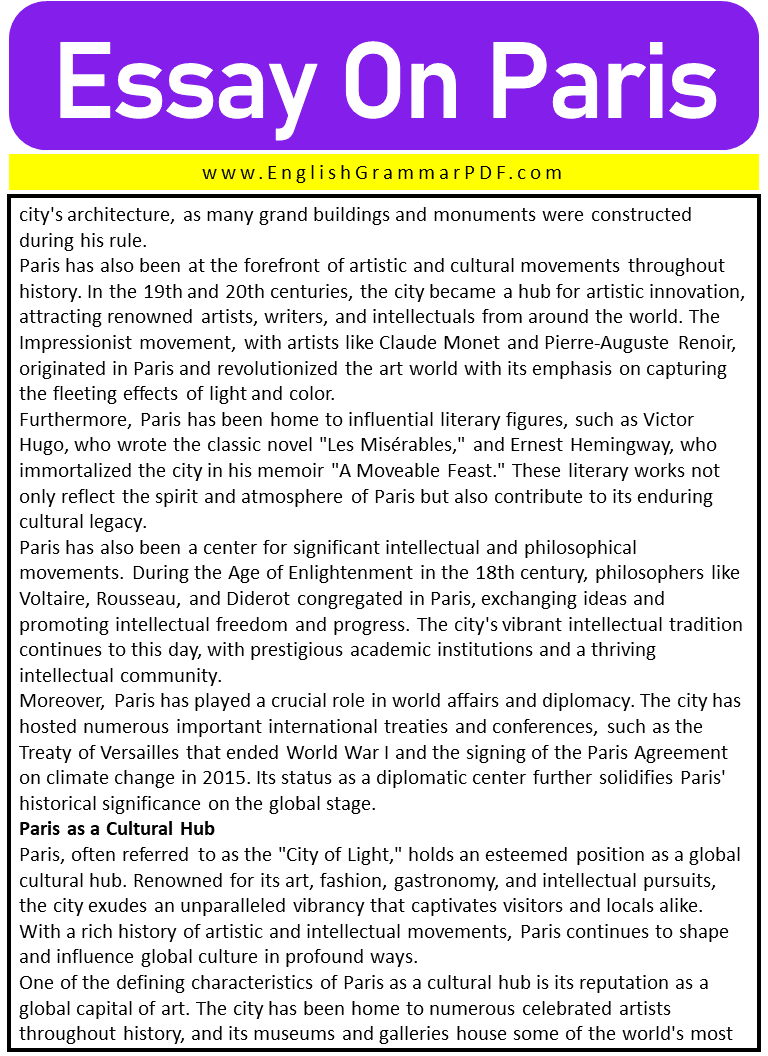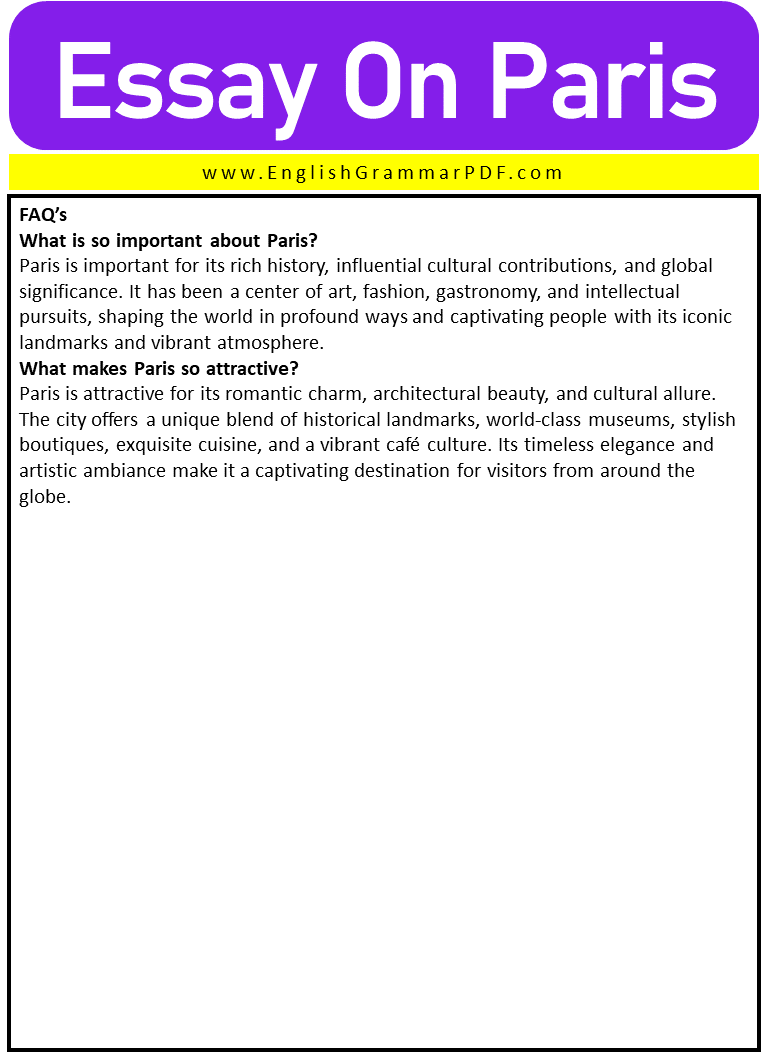Essay On Paris
Outline of Essay:
- Introduction
- Historical Significance of Paris
- Paris as a Cultural Hub
- Architecture and Urban Planning in Paris
- Parisian Lifestyle and Social Dynamics
- Paris as a Tourist Destination
- Environmental Initiatives in Paris
Introduction
Paris, often regarded as one of the most iconic and influential cities in the world, holds a significant place in global history and culture. This essay aims to explore various aspects of Paris, highlighting its historical significance, cultural vibrancy, architectural marvels, unique lifestyle, tourism appeal, and environmental initiatives. By delving into these topics, we can gain a deeper understanding of Paris as a city and appreciate its enduring appeal.
Historical Significance of Paris
Paris holds immense historical significance as a city that has witnessed pivotal events and played a central role in shaping the course of France and the world. From its founding to the present day, Paris has been a focal point of political, cultural, and intellectual movements that have left an indelible mark on history.
One of the most significant periods in Paris’ history is the French Revolution, which occurred between 1789 and 1799. This revolutionary upheaval brought an end to the monarchy and established the First French Republic. The storming of the Bastille, an event that took place in Paris on July 14, 1789, marked a turning point in the revolution and is celebrated as a symbol of liberty and the fight against tyranny. The French Revolution had far-reaching consequences not only for France but also for the development of modern democratic principles and political ideologies worldwide.
Another prominent figure associated with Paris and its historical significance is Napoleon Bonaparte. As the Emperor of the French, Napoleon expanded the French Empire and exerted considerable influence over Europe during the early 19th century. Paris became the capital of this vast empire, and Napoleon’s reign brought about significant political and administrative reforms. His legacy is still evident in the city’s architecture, as many grand buildings and monuments were constructed during his rule.
Paris has also been at the forefront of artistic and cultural movements throughout history. In the 19th and 20th centuries, the city became a hub for artistic innovation, attracting renowned artists, writers, and intellectuals from around the world. The Impressionist movement, with artists like Claude Monet and Pierre-Auguste Renoir, originated in Paris and revolutionized the art world with its emphasis on capturing the fleeting effects of light and color.
Furthermore, Paris has been home to influential literary figures, such as Victor Hugo, who wrote the classic novel “Les Misérables,” and Ernest Hemingway, who immortalized the city in his memoir “A Moveable Feast.” These literary works not only reflect the spirit and atmosphere of Paris but also contribute to its enduring cultural legacy.
Paris has also been a center for significant intellectual and philosophical movements. During the Age of Enlightenment in the 18th century, philosophers like Voltaire, Rousseau, and Diderot congregated in Paris, exchanging ideas and promoting intellectual freedom and progress. The city’s vibrant intellectual tradition continues to this day, with prestigious academic institutions and a thriving intellectual community.
Moreover, Paris has played a crucial role in world affairs and diplomacy. The city has hosted numerous important international treaties and conferences, such as the Treaty of Versailles that ended World War I and the signing of the Paris Agreement on climate change in 2015. Its status as a diplomatic center further solidifies Paris’ historical significance on the global stage.
Paris as a Cultural Hub
Paris, often referred to as the “City of Light,” holds an esteemed position as a global cultural hub. Renowned for its art, fashion, gastronomy, and intellectual pursuits, the city exudes an unparalleled vibrancy that captivates visitors and locals alike. With a rich history of artistic and intellectual movements, Paris continues to shape and influence global culture in profound ways.
One of the defining characteristics of Paris as a cultural hub is its reputation as a global capital of art. The city has been home to numerous celebrated artists throughout history, and its museums and galleries house some of the world’s most revered art collections. The Louvre Museum, with its iconic glass pyramid, stands as a testament to Paris’ commitment to preserving and showcasing artistic masterpieces. From ancient Egyptian artifacts to Leonardo da Vinci’s “Mona Lisa,” the Louvre offers a captivating journey through the realms of art and history. Additionally, museums like the Musée d’Orsay, known for its Impressionist and Post-Impressionist collections, and the Centre Pompidou, dedicated to contemporary art, further contribute to Paris’ status as an artistic haven.
Architecture and Urban Planning in Paris
The architectural style of Paris is distinct and captivating, with its iconic Haussmannian buildings and charming neighborhoods. The essay will examine how urban planning efforts, such as the creation of wide boulevards and public spaces, have shaped the city’s overall aesthetic and livability. By analyzing the choices made in architectural and urban design, we can appreciate the unique beauty and functionality of Paris’ urban landscape.
Parisian Lifestyle and Social Dynamics
Paris is synonymous with a sophisticated and elegant lifestyle, often romanticized in popular culture. This section of the essay will explore the concept of the “Parisian lifestyle” and its associations with art, literature, and café culture. Additionally, we will examine the city’s social dynamics, considering factors like diversity, the challenges of gentrification, and social inequality that exist within the city.
Paris as a Tourist Destination
Paris is a magnet for millions of tourists each year, drawing them in with its allure and charm. This section will discuss the reasons behind Paris’ popularity as a tourist destination, showcasing its captivating attractions such as the Notre-Dame Cathedral and the famous Champs-Élysées. Furthermore, the essay will analyze the impact of tourism on the city’s infrastructure, economy, and local communities.
Environmental Initiatives in Paris
Recognizing the importance of sustainability, Paris has embarked on various environmental initiatives. This section will delve into the city’s efforts to become more sustainable and environmentally friendly. Initiatives like the bike-sharing program and the pedestrianization of certain areas will be highlighted, and the essay will examine the challenges and successes encountered in implementing these initiatives.
FAQ’s
What is so important about Paris?
Paris is important for its rich history, influential cultural contributions, and global significance. It has been a center of art, fashion, gastronomy, and intellectual pursuits, shaping the world in profound ways and captivating people with its iconic landmarks and vibrant atmosphere.
What makes Paris so attractive?
Paris is attractive for its romantic charm, architectural beauty, and cultural allure. The city offers a unique blend of historical landmarks, world-class museums, stylish boutiques, exquisite cuisine, and a vibrant café culture. Its timeless elegance and artistic ambiance make it a captivating destination for visitors from around the globe.
Explore More Essays:
Download the PDF of Essay







